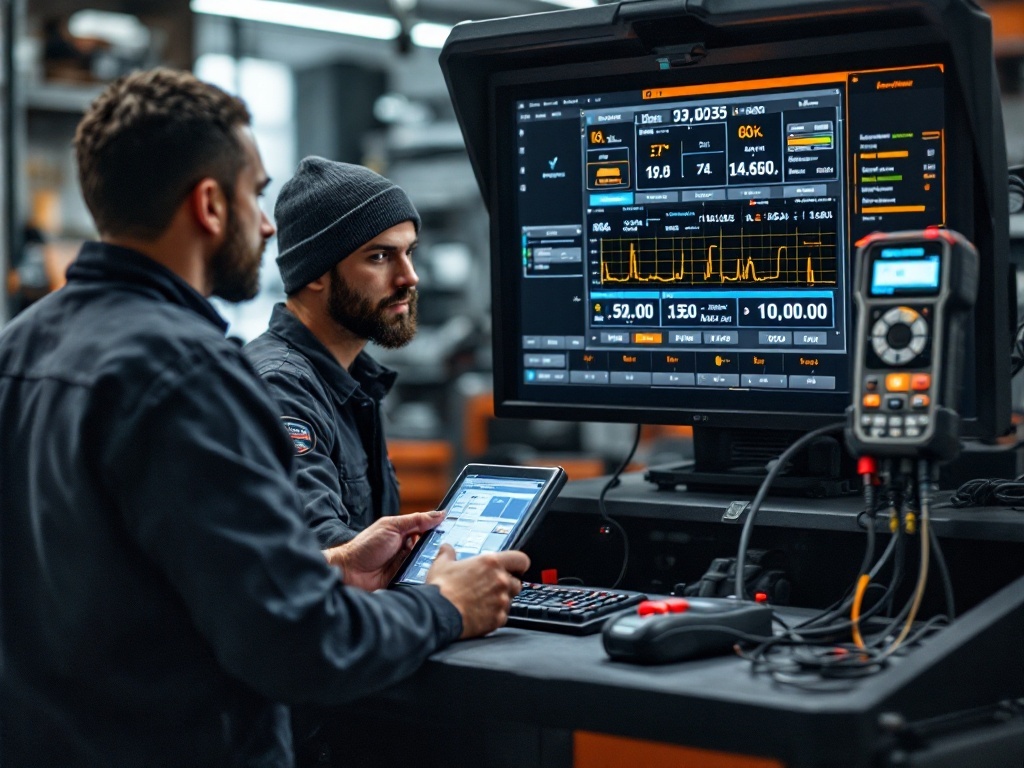
The automotive repair industry is evolving rapidly, and AI-powered research is revolutionizing how vehicle repair shops diagnose issues, streamline operations, and enhance customer service. By leveraging AI-driven tactics, auto repair shops can reduce diagnostic errors, optimize parts procurement, and predict vehicle failures before they occur.
In this guide, we’ll explore AI deep research strategies and actionable tactics that can help auto repair businesses stay ahead of the competition.
1. AI-Powered Vehicle Diagnostics
How AI Enhances Diagnostics
AI-powered diagnostic tools analyze vast amounts of vehicle data, comparing real-time sensor readings with historical patterns to detect anomalies.
Benefits:
-
Faster troubleshooting: AI reduces the time spent on manual diagnostics.
-
Enhanced accuracy: AI minimizes human errors.
-
Predictive maintenance: Shops can anticipate failures before they occur.
Recommended Tools:
|
Tool
|
Features
|
|---|---|
|
OBD-II AI Assistants
|
Real-time error code analysis and solution recommendations
|
|
Deep Learning Models
|
Pattern recognition for complex engine problems
|
|
AI Chatbots
|
Guides mechanics with step-by-step repair suggestions
|
2. Predictive Maintenance for Customer Retention
AI-driven predictive maintenance helps vehicle repair shops offer proactive solutions, ensuring customers return for preventive care rather than emergency fixes.
How It Works:
-
AI collects and analyzes vehicle performance data.
-
Predictive algorithms forecast when specific parts will fail.
-
Shops notify customers before issues arise, increasing loyalty.
Implementation Steps:
-
Integrate AI-powered telematics with customer vehicles.
-
Use predictive analytics to monitor wear-and-tear trends.
-
Automate notifications for service reminders based on AI insights.
3. AI-Enhanced Parts Inventory Management
A common issue in repair shops is maintaining the right inventory levels. AI can optimize parts procurement by analyzing repair trends and forecasting demand.
AI Strategies for Inventory Optimization:
|
Strategy
|
Benefits
|
|
Machine Learning Forecasting
|
Predicts future demand to avoid overstocking or shortages
|
|
Automated Supplier Management
|
AI suggests the best suppliers based on price, quality, and delivery speed
|
|
RFID & IoT Tracking
|
Ensures real-time inventory updates
|
4. AI-Driven Customer Interaction & Support
Customer satisfaction is a key differentiator in the auto repair industry. AI chatbots and virtual assistants provide instant customer support, scheduling, and service updates.
AI in Customer Service:
-
Chatbots for FAQs: Answer common customer inquiries.
-
AI-powered scheduling: Suggests optimal appointment slots.
-
Personalized service recommendations: Uses past service history to offer tailored advice.
5. AI for Marketing & Online Presence Optimization
To attract more customers, auto repair shops must leverage AI for digital marketing, local SEO, and social media engagement.
AI Marketing Tactics:
|
Tactic
|
How It Helps
|
|
AI-Powered SEO
|
Optimizes website content for local search visibility
|
|
Chatbots for Lead Generation
|
Converts website visitors into customers with instant responses
|
|
Automated Review Management
|
Encourages satisfied customers to leave online reviews
|
6. AI & Augmented Reality (AR) for Training Mechanics
AI-powered training programs combined with AR can upskill mechanics efficiently, reducing training time while improving expertise.
AI & AR Training Benefits:
-
Interactive repair simulations.
-
Hands-free guidance via smart glasses.
-
AI-driven assessments to track mechanic progress.
7. The Future of AI in Vehicle Repair
The future of AI in auto repair includes self-healing vehicles, AI-driven robotic mechanics, and fully automated service stations. Shops that embrace AI now will position themselves as industry leaders.
Frequently Asked Questions (FAQs)
1. How can small auto repair shops afford AI tools?
Many AI solutions offer scalable pricing, and cloud-based tools require minimal upfront investment.
2. Will AI replace human mechanics?
No. AI assists mechanics by providing insights and automation, but human expertise remains essential for complex repairs.
3. What are the best AI tools for auto repair shops?
OBD-II AI diagnostic assistants, predictive maintenance software, AI chatbots, and inventory management systems are highly recommended.
4. How long does it take to implement AI in a repair shop?
Implementation timelines vary, but shops can start with basic AI-powered diagnostics and inventory tools within weeks.
Conclusion
By integrating AI deep research and tactics, vehicle repair shops can enhance diagnostics, streamline operations, and improve customer satisfaction. AI-driven tools not only optimize business efficiency but also help repair shops stay competitive in the evolving automotive industry.
Ready to future-proof your auto repair business? Start by exploring AI-powered solutions today!

Brad Killgore is a Best Selling Author, Speaker, Military Veteran, and Strategic Marketing Expert with over 18 years of experience in the industry. Brad loves to spend time with his family and 3 grandchildren. He is an avid traveler who previously lived full-time with his wife in their luxury RV for 3 years. He has worked on some of the biggest concert stages in the world and met some of the most famous Rock Stars on the planet. Brad is a car and motorcycle enthusiast who has attended thousands of concerts over the last 45 years. Brad has been featured on top media outlets for his outstanding marketing results for America’s Best Shops. Brad is a Trailblazer in the world of AI strategy and automation.




